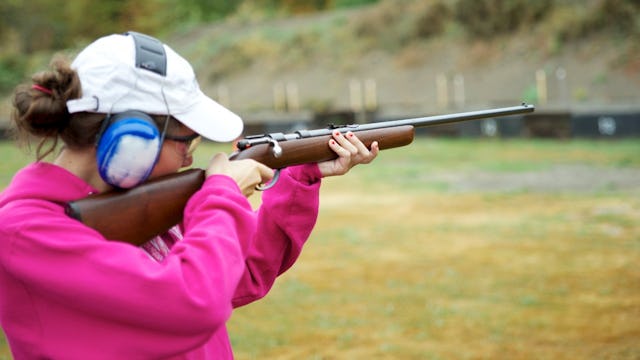Why I Refused To Let My Teen Go To The Shooting Range

A few weeks ago, we spent a fun evening with some friends and their kids. Late into the evening, one of the parents mentioned taking his sons, and some other boys, out to the open air shooting range the next day.
Of course, my son asked if he could go, too.
He’s 17. He gets great grades, is responsible and makes good choices. He’s a leader, an athlete, and a great kid all around. His friends fall in line with all of the above, including the kid whose dad was the organizer of the gun-related field trip.
I have never shot a gun, or even held one for that matter. My husband, his father, is passionately anti-gun, and we don’t have them in the house. So, of course, my son has also never held a weapon or shot a gun.
“NO CHANCE ON EARTH HE GOES,” I said inside my head, before he even had the chance to ask. Then, he asked. First, he asked his dad. Who said no, unequivocally. Even with the typical “But I’ll be careful!” and “(This dad) goes all the time, he knows what he’s doing, and we will be safe” comments, my husband had all the right rebuttals. “No” is never good enough for a teenager.
Later, when we got home, my son asked me if he could go. He didn’t do it in the usual sneaky way that kids do, when they first ask one parent for permission; then, when they don’t like/accept the first answer, they move on to the next parent, hoping for a different response. Nope. My kid just asked me right in front of his dad. The dad who had already said no.
My first response, like any good parent, was “Didn’t you already ask dad, and he said no?” To which my son replied, “Yes.” So I stood there, perplexed, looking at him, wondering why he thought I might have a different answer. Admittedly, I am often softer on my kids, and they know I can also be the more reasonable one when they try to push the envelope a little. But, in this case, I had heard my husband’s reply, and his explanation, and I didn’t disagree.
So, I carefully crafted my reply. Because we do love his friends, and just because they may choose to shoot guns, it doesn’t make them bad people.
Both my husband and I tried to explain that these are teenage boys; they are carefree and careless, and using guns requires focus and maturity. We don’t know (that dad’s) experience with guns; we have no idea how he manages the chaos that could come with 4+ teenagers clamoring for “their turn” or how to ensure everyone’s safety.
However, the crux of the argument lies with this, which is what I said to my son: “I can live with you being angry because we said no. I cannot live with the consequences of the ‘what if’ if it were to happen in this situation. I cannot imagine living with the pain and agony of ‘we should not have let him go’ or the guilt of ‘it was an accident,’ whether you were the one injured or the one that made a terrible mistake, causing harm to someone else. So, no.”
Parenting means allowing our kids to grow and learn, to make choices, to parent through those challenging times and to allow them to both thrive and fail. But these moments — these very critical moments that may have consequences that we can’t live with — that’s when the hardest part of parenting happens.
He didn’t argue any more. He may have been frustrated, but he wasn’t angry. I’m overprotective in many ways, and it has worked for me thus far. He gets it. For us, it was guns; for you, it may be something else. Choose what you can live with.